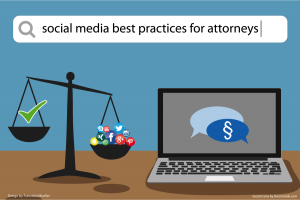Social Media Best Practices for Attorneys

Bringing together a three-person panel, Ken Herron at Unified Inbox outlines the best global practices for professionals in the legal industry
To pull together the global social media best practices for attorneys in April 2016, I convened a three-person panel of people who are successfully using social media. Please meet Sunil Rupasinha of kenttrafficlaw.co.uk, Rupert Connelly of
dialabrain.com, and Florian Demmler of winheller.com.
With so many attorneys now successfully using social media to market themselves and their firms, why did I select these three people? Sunil is a solo practitioner, Rupert runs a website where attorneys can bill by the minute, and Florian directs the marketing efforts for his global law firm. I also wanted people with diverse academic and professional experiences, who are based in different countries.
Below are six questions I asked each of them, along with their answers (note: answers are edited for length and clarity).
1. What would you advise an attorney who wants to begin using social media – or, is not happy with the results they are getting from their social media?
Sunil: Don’t spend time on social media until you work out your strategy. Do this first, or you’ll spend countless hours tweeting, blogging, and posting, only to discover you’re not maximising the return on your time.
Rupert: Be the “good guy.” Don’t just write to be the expert in your field, but to share something of value without expecting anything in return. Remember, anyone can repeat the headlines. Your audience will respond positively to receiving a professional’s perspective, your perspective.
Florian: The most important task before you start using social media is to identify who it is you want to reach. This may sound obvious, but attorneys need to understand who their audience is. Your audience will not just determine your content, but how best to engage with them on each of your social media channels. As the saying goes, you can’t win the race if you can’t find the finish line.
2. What do you wish you had known about social media before you started?
Sunil: No matter how much time you spend learning about social media, there is always more to learn. Because of this, consider paying for the best advice you can find to sort out the right strategy for your business. Trying to go it alone can not only be frustrating, but end up wasting time and money.
Florian: You’ve heard the term “earned media”? Well, social media is earned media. Your audience won’t just automatically share, like and comment on everything you post. It has to be worth sharing, liking and commenting on – you literally have
to earn it.
to earn it.
3. What types of content, posts on social media, have been the most effective for you?
Sunil: Longer is not better. Don’t write overly long posts. Shorter blog posts are more likely to be read all the way through.
Rupert: The best-performing attorneys on DIALaBRAIN post about what’s topical, trending topics and what’s in the general and legal news.
Florian: Name-dropping. Our best-performing content mentions influencers, organisations and individuals with large audiences who are active on social media. For example, one of our WINHELLER attorneys recently held a guest lecture at the Washington University in St. Louis. Just by [correctly!] tagging the university in the post, the post’s reach increased dramatically compared to posts with similar content which had not tagged the university.
4. Do you have any specific tips for your fellow attorneys to increase their audience growth (follower management), audience engagement (audience management) and/or creating content (content management)?
Sunil: When you find what works for you, stick with it! Accept upfront that it’s going to take a certain amount of time each day.
Rupert: The sweet spot content-wise is to post about changes in laws and about cases receiving heavy media attention. Then follow-up on your post with a related article (typically on LinkedIn), where you can explain a point of law that would not be obvious to a layperson.
Florian: From our experience, the easiest way to grow your audience is to add value in your posts. The audience should always “get something” from your content. Appropriate uses of humor, on an occasional basis, can also be well-received.
5. Which social media tools do you use?
Sunil: My website captures the identities of people who respond to my content. I also make sure that my social media is integrated – not duplicated – across the different networks that I use, and that each channel links back to my website.
Florian: WINHELLER uses Outbox Pro (http://outbox.pro) to create, review, and approve our posts, and Fanpage Karma (http://fanpagekarma.com) to monitor our Facebook pages. For us, Outbox Pro is the best way to handle a team of multiple editors and attorneys. Our attorneys simply create posts, which are sent to our marketing executive, who makes the necessary edits and posts them to our networks. If there isn’t already an image with the post, we’ll add it here. Fanpage Karma is a great tool for Facebook page analytics so we know which posts have been the most successful.
6. Social media has become a visual medium, what is your marketing strategy for using visual content in your posts?
Sunil: It’s no longer enough just to write great posts, they also have to look great, and it’s your image(s) that grab people’s attention and get them to read your post.
Florian: This is something that does not come as naturally for us. In addition to using quality stock photography and illustrations, we have begun making it a habit to always take photos at company events, conferences, and meetings, whether they’re held in the office or off-site.
Do you have advice on social media you would like to share? I welcome differing opinions which can help contribute to the dialog of the best social media practices for attorneys in different countries and legal specialties. Please share your experiences with us.






LEAVE A REPLY